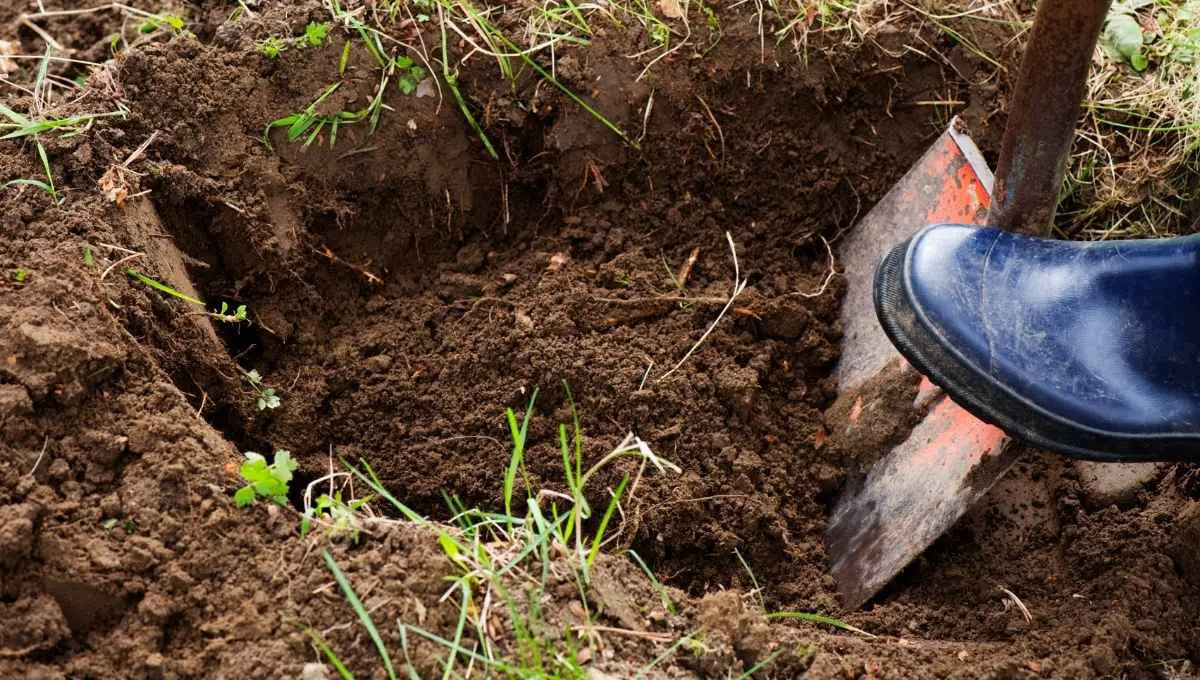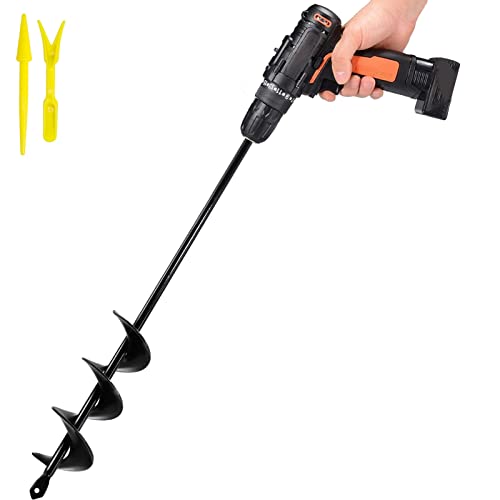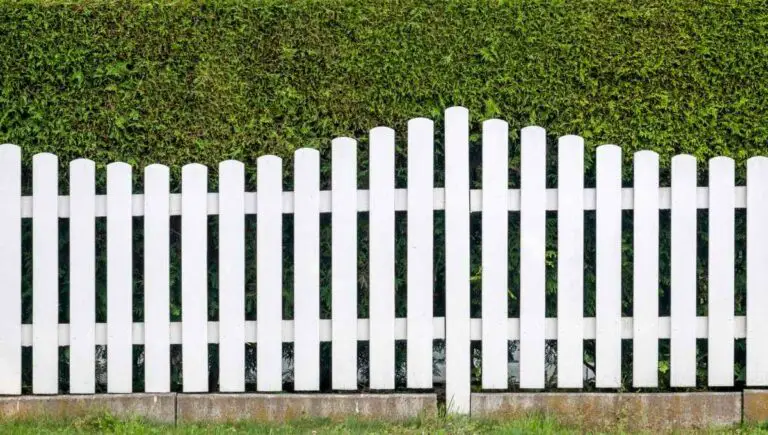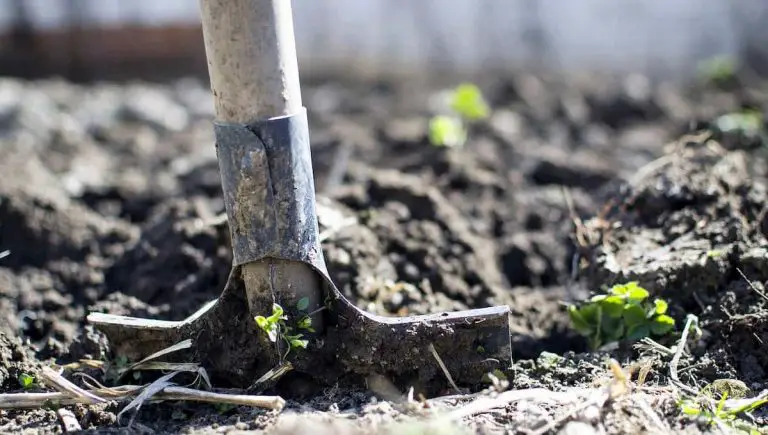How Deep Can I Dig In My Backyard? (Check For this First)

Knowing how deep you can dig in your backyard before beginning a project can save you from unwanted setbacks later on, specifically from your city. So what is the appropriate depth of digging in your backyard?
You can dig five feet deep in your backyard after calling 811 for permission. Calling 811 is essential because it helps prevent damaging underground utility pipes. However, you may need extra building permits if you wish to go deeper.
All projects require a creative mindset, but this mindset must also include the requirements of the law.
So, in this article, we’ll discuss all-things digging, the laws that apply, the requirements, and the dangers you may encounter if you choose to dig without getting proper permission.
This post contains affiliate links from Amazon and other stores. This means Yard Blogger may earn a commission if you make a purchase using any of our links. Please refer to our full affiliate disclosure policy for full details.
Here’s a Quick Pro Tip!
You can safely dig 12 inches deep into the ground, or five feet. But, you may need a permit from 811 first or further building authorization for larger projects.
We highly recommend you check with your local ordinances to ensure you are not violating the law.
However, you can still check out these digging products that can help you in this:
1. Red Digging Drill – Perfect for excavating deep, modest holes in your yard.
2. T-Handle Shovel – For harder, meticulous digging work.
3. Multi-purpose Digging Tool – How about five in one? This multipurpose digging tool can serve you for the most detailed gardening project for your yard.
Digging in the Yard
Technically, we can just pick a shovel and make a hole in our yards. But is this appropriate? Moreover, is it allowed? Let’s discuss these things below.
How Far Down Can You Safely Dig?
You can safely dig a hole up to 12 inches deep in your backyard without risking stumping against a utility and ruining it. Standard underground utilities include gas lines, electric wires, water lines, etc.
If you dig below 12 inches deep into the ground (recommended shovel for this), there’s a high chance that you’ll find one of the utilities abovementioned.
If, as a result of this, you damage the utilities within, said utilities will be cut from the person benefitting from them, and serious issues may arise from this. Keep an eye out for white pipes to help you avoid any issues!
What’s the Deepest Hole You Can Dig?
It’s possible to dig a hole five feet in-depth, but it will all depend on the purposes of the excavation project that you are to do in your yard. Anything deeper than this is likely to require a building permit and probably, a planning permit.
In terms of working in your yard, you can drill a hole as deep as five feet. Anything deeper will require special authorization from governing authorities in your area.
As a fun fact: in terms of the deepest hole ever dug on Earth, the Z44 Chavyo oil and gas well is the deepest hole ever dug by humanity.
Its depth is 7.7mi, which is equivalent to 12.37m. Although, the internet has a serious debate about this.
How Deep Can You Dig Without a Permit?
You can dig around four inches into the ground without a permit, but this practice isn’t recommended because of the risk of damaging utilities. Regardless of its apparent safety, you should still make a “safe-digging” call to keep things safe.
Even though a few inches won’t hurt, the reality is that it still poses some risks. You can’t just take a shovel and dig without considering them.
So, you must discard these risks by making a responsible call to 811 to determine if there are any utilities around your ground.
And, even so, some projects will require permits regardless of the depth of the hole you’re going to dig.
The reason behind this is that it may involve electrical work, and this is likely to require a permit. For instance, building a pool is likely to require electrical permits.
How Deep Can I Dig In My Yard?
You can dig 12 inches deep in your yard after contacting and receiving consent from 811. Anything deeper than 12 inches may require you to hire a contractor and retrieve other extra permits from the government.
You can contact 811 to retrieve information about any underground utilities in your area and to receive consent from proper authorities. 12 inches is equivalent to one foot, so usually, there is no problem with this.
However, if you are planning to dig in your yard for a bigger project, we suggest you consult with a local contractor to determine if there are any other permits you may require.
How Deep a Hole Can I Dig on My Property?
It’s recommended to dig one foot or five feet deep in your yard, depending on the type of excavation project you require, while also following extra protocols that are often involved with the quality of the soil that exists on your property.
Your soil is an essential factor to consider when planning an excavation project, primarily because it will determine how stable your home will be after digging.
Of course, this mainly applies when you need to make a deeper hole.
If we are talking about a small excavation for an electrical project (for example, digging an underground extension cord), you will need to follow the protocols for that excavation.
It often includes an inspection to determine where is it proper to do the digging.
How Far Down Is It Safe to Dig?
You can dig one foot or five feet down in your yard’s soil, but you need to contact 811 to ensure it is safe. Even though it’s generally safe to dig a few inches down, it is still recommended to follow proper protocol to avoid serious accidents.
The types of accidents we speak about are the ones that involve damaging any utility lines below, such as a gas line or an electric line.
Generally, for electric work, you need someone to inspect the ground before digging to avoid having these types of accidents.
You might also enjoy our post on If You Need a Permit to Dig a Pond
Getting Permission to Dig
Any construction project needs a permit, and digging in your backyard is no different. Therefore, searching for the needed permits is essential if we want to abide by local protocols.
So, let’s discuss it below.
Can I Dig a Hole in My Backyard Without Permission?
It’s not recommended that you dig a hole in your backyard without proper permission from governing authorities because underground utilities may be affected and cease their adequate functioning due to an accident.
Additionally, these accidents can affect you and the neighbors around you. If one of the utility lines is broken or damaged, it’ll likely leave you, or them, without said utilities.
For example, if you damage an electric line, you may be left without power.
Furthermore, since the accident would have occurred in a situation where you did not receive permission to dig, you can be legally liable and fined for being negligent.
In short, you’d be confronting severe legal proceedings if you don’t call 811.
Do You Need Planning Permission to Dig Underground?
Any type of underground-digging project needs planning permission because there are many factors to consider when the project initiates. A certified contractor that specializes in this area can give you better details.
Not getting permission for an underground excavation is illegal.
If something bad happens because of a lack of compliance with the word of law, you can be subject to severe fines and other harsh consequences.
Do You Need Planning Permission to Dig Down in Your Garden?
Although minimal landscape projects that require structural changes need planning permission, other digging projects surrounding your garden don’t always need them. For example, you need a permit for planting trees but not necessarily for small flowers.
Aside from planning permission, some landscaping projects require you to hire a contractor and retrieve bigger building permits.
If you consult an expert, they’re likely going to give you a better idea about what you need and don’t need and what local ordinances you must follow.
Is It Legal to Dig a Tunnel in Your Backyard?
It can be legal to dig a tunnel in your backyard, but it will likely depend on the state you live in and the type of soil where your property stands. Experts can survey the soil and give you the insight to determine if it’s possible.
You need a survey or an inspection of the soil because strict building protocols regarding tunnels must be followed to keep you and your family safe.
Another reason is that you don’t want to risk the stability of your property, so the soil on which it stands must be checked to ensure that the construction of said tunnel won’t partake in the risk of having an unstable floor.
And, before beginning any digging project, you must ensure to consult your local ordinances because you may need to have planning permission for the idea you want for the yard.
How Deep Can I Dig Before Calling 811?
No specific depth is established for digging before calling 811, so it’s recommended that you call anyway, no matter how big or small the digging is. There is a high chance that things don’t go well if you decide not to call.
Whether the hole is 1 foot or 5 feet, 18 inches or 32 inches, you must always call and consult with 811 to get permission and additional information you may require for the project that you are planning for your home.
If you don’t ensure the safety of the excavation before beginning to dig, there is a high chance that you may harm any utility line, your family, or even yourself.
You might also enjoy our post on If You Need a Permit to Regrade Your Yard
Is It Against the Law to Dig Without Calling 811?
Digging without calling 811 is against the law in most of the United States, and not complying with said regulations can subject you to serious fines and other costly fees. These regulations are meant to ensure your safety.
For example, Indiana Law requires its citizens to call 811 at least two days before the beginning of the digging project, and a failure to do so can make you subject to pay $10,000 in fines.
But, in Virginia, an Underground Utility Prevention Act specifies that all excavators must obtain permission to begin their projects.
Moreover, they also have a $10,000 fine for any damages caused to utilities while digging.
Digging Around the Home
Permission is required to dig in your yard, but can you dig around your home without any issues? A lack of information likely leads many people to make mistakes, so let’s get informed below.
How Close to My House Can I Dig a Hole?
You can choose to dig close to your home’s foundation if it does not threaten its safety, but you should always consult with a certified expert before beginning the excavation.
So long as the foundation is safe and does not threaten its stability, it is fine whether you dig closer or further.
Some people choose to dig 2 feet far from the foundation to make sure everything is safe, regardless of what type of hole they choose to dig.
Can You Dig a Hole Anywhere on Your Property?
Even though it would be convenient, digging a hole anywhere on your property is not always feasible because you are subject to the safe digging laws of your state. If you don’t receive permission to excavate in a certain area, you can’t proceed with the project.
You can dig in a spot where you know there are no utilities underground, but to know this, you have to call 811 first.
And if they find that there are too many risks, you can’t proceed to dig on your property.
Besides, you can’t go and exactly dig in any spot of your property without making sure that there are no risks involved because it may hurt you and others.
So, always make sure to understand and follow your local ordinances before proceeding.
Can I Dig a Basement in My Garden?
You can dig a basement in your garden after searching for your local ordinances and determining what requirements you must fulfill to go by the word of law. Additionally, you must hire an expert that can survey the soil to ensure your floor’s safety.
Not all types of floor can handle the excavation that a basement requires, so it’s wise to hire someone that can tell you if this is possible in your yard.
Moreover, there are other strict regulations you must pay attention to before beginning the project. Hiring an expert in the field can help you know your possibilities, so you should look for one.
You might also enjoy our post on If You Can Dig a Well on Your Property
How Close Can You Dig Next to a Footing?
To determine how close you can dig next to a footing, you have to imagine a 45-degree angle line that runs from the edge of the footing to the edge of the excavation. The digging shouldn’t be done below this line.
If you go below this line, there is a high chance that the house will yield to the soil, and the structure will be in grave danger of collapsing or suffering bigger damages.
Therefore, before beginning any project, consulting with your local residential codes is important.
How Deep Do You Have to Dig to Hit Bedrock?
You have to dig between 100 feet to 500 feet below the ground to reach bedrock, but this number can vary depending on your soil type. Certain types of soil will allow you to reach bedrock faster.
In some places, sometimes the bedrock is the ground, but in others, it can even take more than 500 feet to reach it. So, your soil type contributes to how much you must dig to reach the bedrock.
Related Questions
Is It Illegal to Dig a Hole at the Beach?
Digging a hole at the beach isn’t illegal when it is done in a small spot and when its depth does not go above the knee length of the smallest person in a family. Other forms of digging are not permitted because of safety reasons.
However, most beaches have their own ruling regarding digging holes and tent placing.
An example is what Myrtle Beach did back last year, in May of 2021, when they made digging holes bigger than two feet in-depth illegal.
There are many dangers concerning digging holes on a beach.
For example, if you dig a human-sized hole and someone falls into it, the sand surrounding it will start gathering around them, and they can suffer lethal injuries if they end up buried within.
Therefore, it’s important for you to follow the rules when you go to a beach or any other place where there is sand. Doing so can help you avoid many fatalities.
Can You Dig a Hole in a Public Park?
It’s unlikely that you are allowed to dig a hole in a public park because most of its grounds are government property, and a person who tries to destroy or damage it in any way can face serious charges for violating these rules.
Moreover, public parks tend to have their own rules regarding the uses of the park.
Those rules will specify designated areas for children’s playgrounds that may or may not involve sand, where they can likely play with toy shovels.
But, any other general intent of digging or moving soil can be a crime, and the park’s owner has an absolute right to sue you if you cause serious damages. So, we don’t exactly recommend that you try this.
Is Calling 811 Free?
Calling 811 is free because their service is paid for by your local utilities for the purpose of ensuring safety for everyone. Thus, there is no excuse for any individual not calling them or getting educated about digging matters.
You can safely call 811 if you need to dig something but don’t know where to start.
They will provide you with all the information you need to be able to commence your project. If you’re still unsure, you can check this document to find out more.
Final Thoughts
Digging requires a lot of effort, but more effort will require to pay the huge fines you’ll get if you don’t act responsibly. So, you must call 811 before beginning any digging project you have planned for your yard.
Additionally, certain types of yard work may require getting extra permits, like electric permits. These permits are more common when building in-ground pools or artificial ponds.
Most states have made calling 811 a law after many incidents happened with utilities. Most likely, they got heavily damaged in the past, so many neighborhoods suffered because of it.
So, make sure to abide by the word of law and call them before doing anything.











